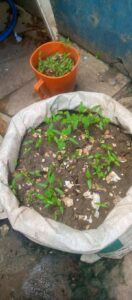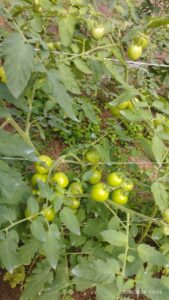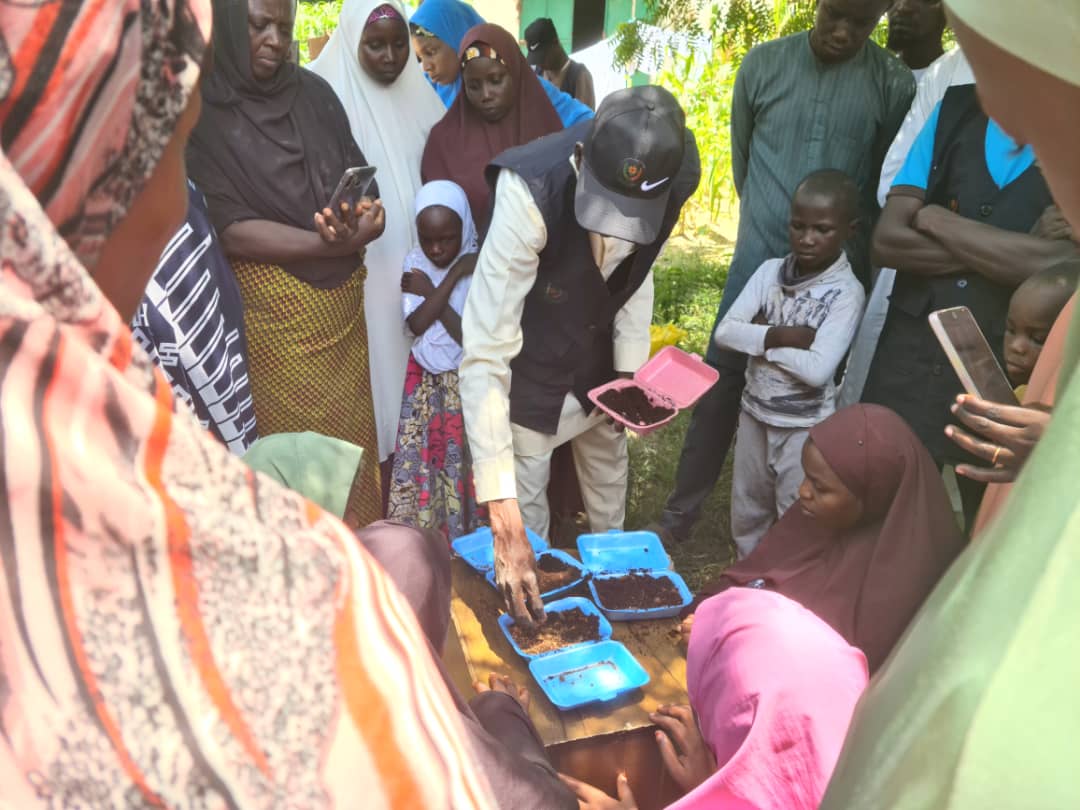Growing up in the Malari community of Nigeria’s Yobe State, Asmau Muhammad saw her mother, Hadiza, sustain the family through farming. By 2014, the Boko Haram insurgency in northeastern Nigeria had intensified to the point of disrupting Hadiza’s farming efforts, as some fields became inaccessible. Despite the return of relative peace to some Yobe communities in recent years, allowing Hadiza to resume farming, the escalating climate change crisis has further heightened the challenges faced by local farmers like her.
Climate change has taken a severe toll on agriculture in developing countries like Nigeria as small-scale farmers grapple with crop failure and income loss due to a lack of understanding.
Recent flooding disasters across 29 states in the country have claimed lives and left farms in ruins. The FAO is gravely concerned about the possibility of persisting hunger, amidst the nearly 31.8 million Nigerians facing severe food insecurity.
This cause for concern follows an earlier grim prediction in March by the United Nations Office for the Coordination of Humanitarian Affairs (OCHA) of severe food insecurity that would impact an estimated 4.8 million people in northeastern Nigeria during the lean season.
Ibrahim Aliyu Izge, a researcher studying climate change patterns in northeastern Nigeria, acknowledged the encroaching impacts of climate change on public health. Shifting environmental conditions due to climate change, he explained, increases the risk of flooding while aiding the spread of diseases such as cholera, dengue fever and malaria, which he asserted still remains the biggest killer in Africa. This reflects a World Bank study, which predicts that climate change will lead to an additional 250,000 deaths annually between 2030 and 2050 due to malnutrition, malaria, diarrhoea, and extreme heat.
“Climate change also destabilises families’ sources of livelihood. It causes food insecurity, which will lead to malnutrition,” Izge said, pointing at the recent flood in Maiduguri and its ravaging effects on the state’s agriculture. Prior to the recent climate disasters, Izge had observed a shift in the length of the rainy season, which he said resulted in reduced average rainfall. This has led farmers to seek more fertile land while pastoralists also encroached on farmland in search of grazing areas for their animals. And all of this “heightened the farmers and pastoralists crisis, which has greatly affected the performance of farmers,” Izge said.
Increasing episodes of flooding in Nigeria’s northeastern flank have destroyed farmlands and pushed a great number of farmers into trauma. According to Jecinta Egbim, a mental health advocate, farmers who anticipate a bountiful harvest after months of toil can be particularly prone to depression in the wake of such tragedy.
“Such situations also makes them [the farmers] have suicidal tthoughts,which extends towards attempting suicide,” Jecinta added. “They could also develop physical symptoms like hypertension. They could start having psychosomatic symptoms, like having sensations on their skin, thinking that they are sick while they are not.”
Approaching The Problem
In response, the Okpara-Osim Foundation, an agro-based nonprofit, is implementing a climate action initiative in both rural and urban Nigerian communities. This initiative focuses on mitigating the effects of climate change on agriculture, promoting more resilient farming practices and investing in adaptation strategies to assist farmers in adapting to the changing climate.
Through its coordinator for northern Nigeria, Zanna Ali Haruna, the organisation launched its first project in early 2024, focused on climate-resilient farming practices for women in Yobe State. This initiative followed Zanna’s survey findings, where he found that many communities were still lagging behind agricultural innovations.
“We have decided to raise future domestic small-scale farmers who can bridge the gap in food security using the resources available to them. This serves as a clarion call for Nigerians to get involved in finding lasting solutions to the issue of hunger as a result of the climate change crisis ravaging the country,” Zanna said.
Asmau and her mother, Hadiza, joined dozens of other women who were coopted into the initiative for a 2-day training on sustainable agricultural practices. The women were shown how to cultivate crops in sacks using minimal water, a means to address future environmental concerns. Each woman also received seedlings with which they could practise their newly acquired knowledge after the training.
Zanna explained that the farming process is entirely organic and that the beneficiaries are also receiving climate education.

Following this, Asmau and Hadiza soon began planting and harvesting various vegetables and fruits within their homes. “We were able to save a lot from buying groceries outside and was even opportune to share what I have learnt with my friends,” Asmau said.
Impacting Many
30-year-old Halima Abubakar had long desired to pursue farming but lacked the necessary resources to pursue her agro dreams until this initiative reached her in the Machina area of Yobe.
“I also needed to know the kind of seed to plant in order to yield good products. And participating in this initiative has changed my situation, which means that it’s possible for me to start little,” Halima said. In the months since the Okpara-Osim Foundation reached out to her, she has begun cultivating tomatoes and Irish potatoes. She is excited about her new venture, as it provides her with a source of income amidst the country’s economic challenges. “I am always trying to improve the process and looking forward to expanding more,” she added.
Zanna’s project in Yobe has met with wide reception, as the beneficiaries have been actively exploring this creative farming method, a cause for delight to Zanna and his team.
Without sufficient knowledge about irrigation systems and farming methods, Asmau Bello never considered agriculture. Besides, it felt unsafe because of Boko Haram attacks on farmers. Her perspectives have shifted since the training.
“This initiative has changed my whole perception on farming,” said 25-year-old Bello. “I am happy that this initiative was brought to our doorstep in order to practice the simplest farming methods that we had no knowledge of before. And we are committed to making use of the knowledge gained.”
Like Halima, Bello received Irish potato and tomato seeds, which she cultivated in her home. Her small harvest has been generating a little income to help cover some expenses, she said.

Towards Sustainability
Halima Yusuf Bawa, a climate action champion, acknowledged the long-lasting impacts of initiatives like this, which help women to save money on food by growing their own food at home.
“It [the initiative] can also serve as a source of income for those that intend to sell out of their harvest, making them financially stable or independent,” Bawa said. “One other impact it can have is environmental management in the sense that less water and space are being utilised to produce high yield and yet, the overall of it is adaptation to climate change; by implementing such practices, we are building our resilience in climate change.”
Bawa stressed the need for policymakers to actively collaborate with and support such community-led responses to climate change because that will contribute to effective engagement and ensuring long-term sustainability.
Limitations
At least 200 female farmers in Yobe have been engaged, Zanna acknowledged. However, challenges persist in the foundation’s mission to reduce costs for the female farmers and address the general food insecurity in the region. Zanna highlighted a major obstacle relating to a lack of awareness about the importance of adopting innovative and climate-resilient farming practices rather than relying solely on the distribution of rice as palliatives to temporarily alleviate hunger.
“Whenever we visit a community to conduct this kind of training and demonstrate this new farming method, their initial expectation is that we are there to distribute rice and other items commonly provided by NGOs,” he explained. He continued that once some of the targeted people realise it’s not about receiving rice or other free items, many get upset and leave. “About 70% of them will leave, while only a few of them stay to fully participate in the training. This is a big problem for us.”
This lack of awareness, Bawa reckoned, is owing to the absence of effective collaborations with local radio stations and community and religious leaders, who will help spread the gospel of climate education.
There is also the problem of high costs, complexity or availability of these technologies on the part of the farmers. “We learned about aeroponic systems of farming where we can use just water and air to grow plants, but we can’t afford to incorporate this into our farming as it’s expensive,” Asmau bemoaned.
Zanna stated that their organisation lacks the funding to provide local farmers with such technologies. Again, Bawa explained that the lack of integration of climate-resilient technologies like green film, which can help increase water retention in soil, is a significant limitation, especially in the Northern Nigerian states, where rising temperatures contribute to rapid water loss from the soil. She highlighted that the technology is one that helps prevent the spread of pests and diseases.
While such technologies can be highly effective, Bawa noted that setting them up can be a huge expense, posing a great challenge to initiatives focusing on climate action in the agricultural sector.
Some of the female farmers, as Zanna put it, are accustomed to traditional farming methods, which makes them hesitant to dabble in climate-resilient alternatives.
Also, in areas such as Geidam and Dapchi overrun by Boko Haram terrorists, it has become impossible for the team to expand its campaigns. This is exemplified by a recent attack on Mafa village in Yobe, which resulted in the tragic loss of hundreds of lives, including farmers. A similar incident occurred in November 2020, when many farmers were killed at a rice plantation in the Zabarmari area of Borno State.
These limitations have not dented Zanna’s mission to spread the project to every part of Northern Nigeria. “Even though it’s difficult, we are not giving up. As the coordinator, I will work with my team to ensure each state benefits from this initiative,” he said.
This report is published in partnership with Nigeria Health Watch through the Solutions Journalism Africa Initiative.
Growing up in a farming family in Nigeria's Yobe State, Asmau Muhammad witnessed the impact of the Boko Haram insurgency and climate change on agriculture. The disruptions included inaccessible fields due to violence and recent severe flooding that devastated farms across 29 states, contributing to food insecurity for millions of Nigerians. Climate change has exacerbated public health risks, increasing the prevalence of diseases and malnutrition. In response, the Okpara-Osim Foundation launched a climate action initiative to promote adaptive farming practices among women in Yobe, providing training on sustainable techniques like sack farming with minimal water use.
This initiative has empowered women like Asmau, her mother Hadiza, and Halima Abubakar to pursue farming, improve food security, and generate income amidst the country's challenges. The project faces obstacles, including limited awareness and funding, high costs of climate-resilient technologies, and security issues due to ongoing insurgency. Despite these challenges, the initiative aims for widespread implementation to support sustainable agriculture and resilience against climate change in northern Nigeria. Zanna Ali Haruna, the project's coordinator, remains determined to expand the program and collaborate with policymakers for effective solutions.






